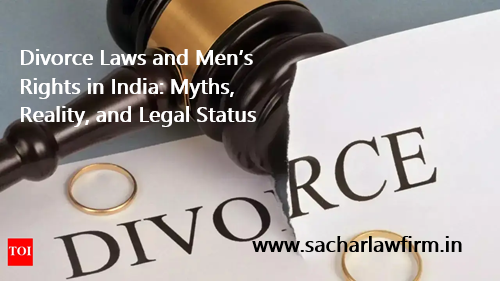AdVocate harshit Sachar | chamber no: 617 | district courts ludhiana | 2817 gurdev nagar ludhiana | ✆+91 7889228369
Divorce Laws and Men’s Rights in India: Myths, Reality, and Legal Status
A detailed look at what Indian law provides for men in divorce cases, the challenges they face, and important Supreme Court judgments shaping their rights.
FAMILY LAWCIVIL LAWS
Advocate Harshit Sachar
9/18/20253 min read


🔹 Introduction
Divorce in India is often seen through the lens of women’s rights, but men too face significant challenges when marriages break down. While the law provides equal grounds for divorce to both spouses, men frequently find themselves disadvantaged due to social perceptions, custodial issues, and maintenance disputes. Understanding the true legal position helps balance these misconceptions and ensures fair outcomes.
🔹 Legal Rights Available to Men
Grounds for Divorce: Under laws like the Hindu Marriage Act, 1955, men can file for divorce on grounds such as cruelty, adultery, desertion, and irretrievable breakdown.
Custody and Visitation: Fathers can claim custody under the Guardians and Wards Act, 1890. Courts generally prioritize the welfare of the child, but visitation rights are often granted even if custody goes to the mother.
Maintenance and Alimony: While Section 125 CrPC allows wives to claim maintenance, husbands can also claim if they are unable to maintain themselves, though courts seldom award it.
Division of Assets: Indian law does not grant automatic rights to the wife over the husband’s property, except through specific maintenance or alimony orders.
🔹 Challenges Men Commonly Face
Custody Bias: Mothers are often preferred for custody of young children, making it harder for fathers to gain primary guardianship.
Maintenance Burden: Men are frequently directed to pay maintenance, regardless of the wife’s financial independence.
Misuse of Laws: Sections of the Dowry Prohibition Act and Domestic Violence Act are sometimes alleged to be misused, leading to harassment of husbands and their families.
Social Stigma: Divorce is still viewed as a failure for men, and legal disputes can damage reputation and career.
🔹 Key Judicial Developments
Joseph Shine v. Union of India (2018) – The Supreme Court decriminalised adultery, stating that criminalising it was discriminatory, though it remains a ground for divorce.
False Allegations Cases – Various High Courts have held that making false allegations of cruelty or dowry harassment itself amounts to cruelty and can be a valid ground for divorce.
Custody Precedents – Courts increasingly consider the financial and emotional capacity of fathers, slowly balancing custody decisions.
🔹 Practical Advice for Men Facing Divorce
Keep a record of communication, expenses, and incidents to protect yourself legally.
Engage an experienced advocate early to avoid being on the defensive.
Do not retaliate with false claims; instead, focus on evidence-based defense.
Explore mediation or settlement to reduce stress and litigation costs.
Prioritize child welfare in custody battles, as courts consider it the most important factor.
❓ Frequently Asked Questions (FAQs)
Q1. Can a husband claim alimony from his wife?
Yes. If a husband is unable to maintain himself, courts can grant alimony, though it is rarely awarded in practice.
Q2. Do fathers have a right to custody of children?
Yes. Fathers can seek custody, but courts usually award custody to mothers for young children. Fathers are generally granted visitation rights, and custody may be considered if it serves the child’s best interest.
Q3. What if false allegations are made against the husband?
Courts have held that false allegations of cruelty or dowry harassment can themselves be grounds for divorce in favor of the husband.
Q4. Is adultery still a crime in India?
No. After Joseph Shine v. Union of India (2018), adultery is no longer a criminal offense, but it remains a valid ground for divorce.
Q5. How long does a divorce typically take in India?
A contested divorce can take 3–5 years, while a mutual consent divorce may be completed within 6–18 months.
Q6. What should men do first when served with a divorce petition?
Immediately consult a lawyer, gather financial records, and prepare a defense strategy. Timely response prevents adverse orders.
🔹 Conclusion
Men’s rights in divorce are often misunderstood. While the law provides equal grounds, practical challenges like custody bias, maintenance disputes, and social stigma weigh heavily on men. By knowing the law, relying on judicial precedents, and seeking professional legal assistance, men can protect their rights and navigate the divorce process with greater clarity and fairness.
Services
Sachar Law Firm – Advocate, Lawyer, Attorney & Solicitor Services in India | Ludhiana, Punjab.
Expert legal advice across various practice areas - Civil, Criminal, Divorce and Matrimonial, Consumer and Corporate laws, Bail Matters, Property Contract Disputes, Insurance claim disputes, cyber Crime cases, Cheque bounce, Family Divisions, Arbitration. Bail Matters, Electricity Board Cases, Appeals before Session court Ludhiana, Marriage certificate, Court Marriage, Succession Certificate Accident Claim (MACT), NRI Legal Matters, NRI Property Matters.
“Get in Touch with Sachar Law Firm”
Quick Links
© 2025. All rights reserved.
Advocate Harshit SACHAR
Legal Blog
2817, 1st Floor , Gurdev Nagar, Ludhiana, Punjab -141001
Address: Office Cum Res:
Corporate Liquidation and Recovery Litigation
☎️ 0161 7965410
